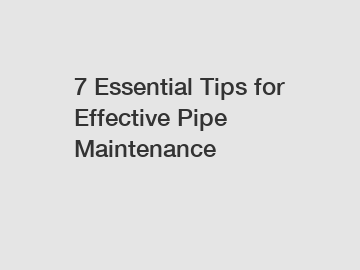7 Essential Tips for Effective Pipe Maintenance
7 Essential Tips for Effective Pipe Maintenance.
Maintaining the pipes in your home or business is crucial for the overall functionality and efficiency of your plumbing system. Neglecting pipe maintenance can lead to costly repairs and potential damage to your property. In this article, we will discuss seven essential tips for effective pipe maintenance, explaining the reasoning behind each tip, its benefits, and the impact it can have on your plumbing system.
1. Regularly Inspect for Leaks and Corrosion.

The first step in effective pipe maintenance is to regularly inspect your pipes for any signs of leaks or corrosion. Leaks can cause water damage to your property and can lead to the growth of mold and mildew. Corrosion, on the other hand, weakens the pipes, making them more susceptible to leaks and potential breakage. By identifying these issues early on, you can take appropriate measures to repair or replace the affected pipes, preventing further damage.
2. Clean Your Drains.
Clogged drains are a common plumbing issue that can lead to serious problems if left unattended. Regularly cleaning your drains is essential to prevent the buildup of hair, grease, and other debris, which can obstruct the flow of water. Using natural drain cleaners or a mixture of vinegar and baking soda can help keep your drains clear and prevent clogs from occurring.
3. Avoid Chemical Drain Cleaners.
While chemical drain cleaners may temporarily unclog your drains, they can also cause damage to your pipes. These harsh chemicals can eat away at the pipes, leading to corrosion and potential leaks. Opt for more natural and environmentally friendly drain cleaning methods to ensure the longevity and integrity of your plumbing system.
4. Insulate Your Pipes.
Proper insulation is crucial to prevent frozen pipes during cold winter months. When water freezes inside the pipes, it can cause them to expand and potentially burst, resulting in water damage and costly repairs. Insulating your pipes with foam or pipe sleeves can help maintain a consistent temperature and prevent freezing.
5. Moderate Water Pressure.
Excessively high water pressure can put strain on your pipes, leading to leaks, burst pipes, and other plumbing issues. Installing a pressure regulator can help moderate the water pressure, ensuring that it stays within safe limits. Monitoring and controlling the water pressure can significantly prolong the lifespan of your pipes.
6. Be Mindful of What Goes Down the Drain.
Being mindful of what you allow to go down your drains can prevent clogs and damage to your pipes. Avoid disposing of grease, oil, coffee grounds, and other non-water-soluble materials down the drain. These substances can solidify and accumulate in the pipes, causing blockages and reducing the overall flow of water.
7. Schedule Professional Inspections and Maintenance.
Finally, regular professional inspections and maintenance are essential for the long-term health of your plumbing system. Having an experienced plumber assess your pipes and perform necessary maintenance tasks, such as cleaning, repairs, and replacements, can prevent major issues and ensure that your pipes continue to function optimally.
In conclusion, following these seven essential tips for effective pipe maintenance will help you keep your plumbing system in excellent condition. Regular inspections, proper cleaning, insulation, and mindful practices can prevent leaks, clogs, and other plumbing emergencies, ultimately saving you time, money, and the stress of dealing with extensive repairs. Take proactive measures to maintain your pipes, and enjoy a well-functioning and efficient plumbing system for years to come.
Want more information on PVC Water Supply Pipe for Wastewater treatment, bridge drainage pipe, Environmentally friendly HDPE Threading Pipe? Feel free to contact us.
90
0
0


Comments
All Comments (0)